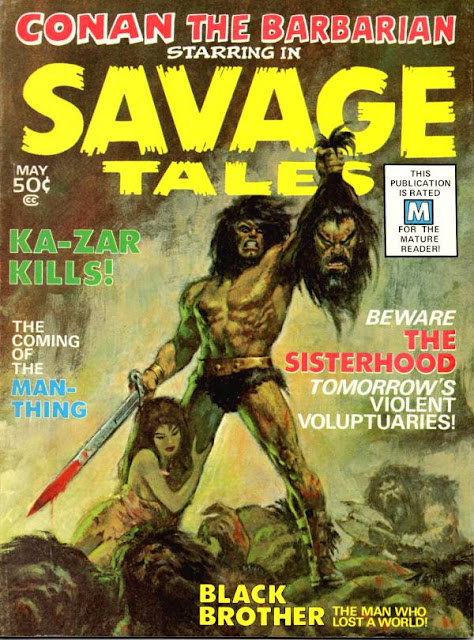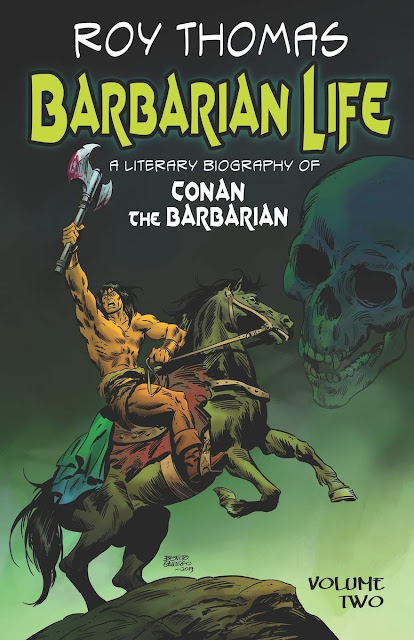While I did not take time to review the issues specifically, I did finish reading the original Roy Thomas run on Marvel's remarkable Conan the Barbarian comic book. Roy wrote the book for a decade, leaving in 1980 with issue one hundred and fifteen. Three artists worked with him throughout most of that time - Barry Windsor-Smith, John Buscema, and Ernie Chan. When BWS left the book, it lost a little of its special charm which had been watching a new kind of comic and a new talent of remarkable quality develop and find their way. Buscema is such a sturdy and reliable artist that it's easy to take the work he does for granted, and to some extent I confess to doing that here.
There's no doubt that the comic post Smith, looked best when "Big John" was either inked by Ernie Chan or himself. Dick Giordano and Tom Palmer both have brief stints, and while the art looks great, but still lacks the specialness which CtB demanded. A fourth talent who spent a lot of time on the book was Gil Kane, once considered to draw it regularly, it's a good thing in the end that he was mostly doing covers. I had forgotten how many issues Howard Chaykin had drawn, but thanks to Ernie Chan those issues still keep the essence of what had come before. Of course, for many of us Neal Adams made a lasting impression with only a few Conan stories, and only one in the regular color run. And while he was not part of the color run, Alfredo Alcala deserves a special mention since he performed a similar task as Chan over Buscema's pencils in The Savage Sword of Conan. Thomas remarks several times that Buscema did not cotton to these inkers, but in this instance "Big" John Buscema, a might man and a might artist was wrong.
Roy himself seem to have found his way to Conan in the most backhanded of ways. He wrote it because he had overpromised the REH estate on royalties in the beginning and planned to take the difference out of his fees if called on the carpet about it. But it seems quickly enough the Hyborian Age got into his blood and before you know it, he's writing the book in such a way as to plan for long schemes such as the period when Conan sails with Belit, the Queen of the Black Corsairs.
Belit's story comes to an end of sorts in issue one hundred where the one actual REH story featuring her is adapted, and of course ends in her death. (That's not a spoiler since most readers at the time knew where the story was headed all the time.) It's clear that with the passing of Belit, Roy seems to lose his passion for the title. The stories which followed the centennial were somewhat listless, though the finale is at once dramatic and memorable.
It was fascinating to read the first one hundred and fifteen issues of Conan (with Giant-Size books and annuals included) all the way through. I've been meaning to do it for several years and it didn't disappoint. I was surprised how many of the stories wrote concocted were adaptations of works by REH and other writers such as John Jakes and Norvell Page. The issues in which Roy develops his own plots are pretty dang good and sometimes the adaptations feel a little forced, and make Conan do things which seem out of character. But what is apparent reading the comics in order like this is seeing how Conan matures. We begin with a young teenager just finding his way in a world which often makes little sense to him and we leave him ten years later, a man in his late twenties (though the way Buscema drew him he always looked at least thirty to me all the time) who has had to lead men and so has become less impulsive, and has fallen in true love for the first time making him more responsive to the needs of women and others in general. Conan after Roy Thomas left him has adventures for sure, but he seems to quite growing up. (Not unlike Peter Parker who matured swiftly in his first decade, but then became rather static.)
Those are my reflections on Conan the Barbarian for now. Let me close things out with a poem by Robert E. Howard. I think that's how the great writer thought of himself, a man who wrote the pulp adventures to earn a living, but who in his heart of hearts yearned to make poetry. Here is the poem "Cimmeria".

by Robert E. Howard
It was gloomy land that seemed to hold
All winds and clouds and dreams that shun the sun,
With bare boughs rattling in the lonesome winds,
And the dark woodlands brooding over all,
Not even lightened by the rare dim sun
Which made squat shadows out of men; they called it
Cimmeria, land of Darkness and deep Night.
It was so long ago and far away
I have forgotten the very name men called me.
The axe and flint-tipped spear are like a dream,
And hunts and wars are like shadows. I recall
Only the stillness of that sombre land;
The clouds that piled forever on the hills,
The dimness of the everlasting woods.
Cimmeria, land of Darkness and the Night.
The 1932 poem "Cimmeria" was discovered by Glenn Lord and first published in The Howard Collector #7 in 1965.

Later Barry Windsor-Smith got hold of it and developed an interesting version of his own. It first appeared in Savage Tales #2 in 1973.


















































.jpg)